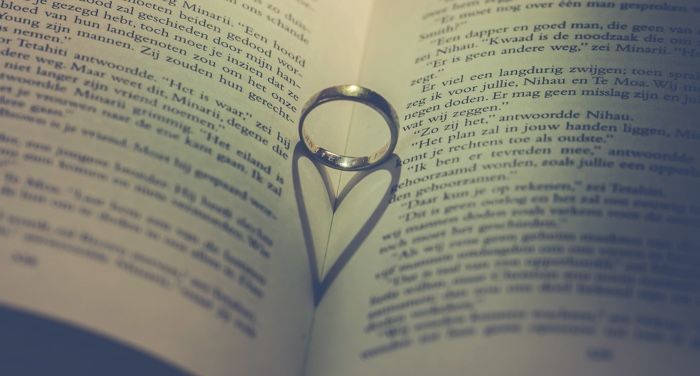
Tips and Tricks For Marrying Another Bookworm Successfully
There are some unique complications that come with the territory of bookish romance. Once you get past genre dealbreakers and the question of whether to dog-ear print copies, there are debates about indie bookstores versus Amazon to be had, authors you will and won’t read and why, and the circumstances under which bookish tourism is ethical. I trust that you’ve already moved past these potential relationship-enders with your SO and are now moving on to the combination of your households. Time to get logistical! Here are some pointers for marrying another bookworm without losing your mind—or your collection.
1. Discuss Duplicates BEFORE You Combine Collections
The biggest issue you’ll run into when combining two robust book collections is space. Getting rid of duplicates is a fraught but unavoidable problem. In addition to being necessary for your space needs, it’s a statement of commitment. By getting rid of your copy of American Gods, you’re declaring that you believe you’ll have access to your partner’s for the foreseeable future.
Obviously, there’s a problem when it comes to deciding whose copy must go. All other things being equal, a couple could opt to choose the copy that’s in better condition. However, factors liked signed status, age, personal history, and important marginalia can affect this metric. In a case where you took your copy of Women Who Run With The Wolves on your solo Pacific Northwest Trail trek and your partner took hers to a transformative queer silent forest retreat in Finland, you may find yourself faced with a draw. In this case, it may be prudent to keep both copies.
If you’re not sure whether your joint venture will survive, offer to weed doubles six months into your cohabitation experience. Otherwise, if you want to save shelf space and decide to keep both copies of a contested title, consider other storage options.
2. Agree on Condition Parameters
Books are both intellectual and aesthetic objects. Some readers particularly value a sturdy, good-looking cover, while others care more about page integrity. For example, many a reader of high fantasy is familiar with the tendency of the glossy map pages to fall out of the mass market paperback versions of the Wheel of Time books. One reader may consider this grounds for replacement of the entire book, while another may consider it an excusable cosmetic problem. When a book is damaged or starts to fall apart, it’s important to agree on whether or not to ditch or replace it.
This is also a good time to have the conversation about weeding verses replacement policies, not to mention communication rules surrounding potential discards.
3. Calculate Space Requirements
You can’t keep growing your collection forever. Even if you and your partner somehow have a spare barn to house your combined collection, you’ll still run out of space eventually. Determine how much you have and how much you need. Then, don’t exceed that. Otherwise, weeding will be more of a traumatic, pressurized experience than a bittersweet farewell. (Or you’ll end up with mountains of books on the floor, and I have some opinions about that.)
Speaking of which…
4. Determine Purchase Budgets
Whether you thrift your books or line up for author signings, you’re going to end up spending a lot of money on literature. The finance talk is one that a lot of couples delay because it’s awkward as hell. This is to their detriment. Your shared love of the printed word is powerful, but not as powerful as your need to eat. Especially when you’re marrying another bookworm, talk about your bookstore pocket change—and all your other finances, for that matter—right up front.
In this case, space is not the first issue on hand. You don’t want to find out eight months in that your partner has been spending $1500 per month out of your $5,000 combined take-home income on ebooks. Don’t get me wrong: that’s charming as hell. It’s just not conducive to the rest of life.

5. Spring for the Nice Bookshelves
Moving in is an important step. You’re establishing yourselves as a permanent couple and beta-testing a future together. For the first year or so, legacy bookshelves from Target or IKEA are fine. After that? My friend, you’re looking at a lifetime of joyful joint collection. High-quality bookshelves may be expensive, but they’ll hold up and look good doing it. Make them fixtures in your home, and don’t forget to screw them to the wall. Even if you yourselves don’t reproduce, odds are good that your friends and family will bring their young kids over to visit at some point.
6. Shelving Classification: How important is it compared to your love?
If you start out marrying another bookworm with a my side/your side shelving strategy, you’re setting yourselves up for heartache. While it’s healthy to keep a sense of ownership about some things you bring to a relationship, this is more a question of collection integrity as time goes on. As you progress in your relationship, you’ll jointly acquire many books whose exact ownership is blurry. This will only get worse over your many years together. Eventually, you may come to think of your combined collection as “ours,” and then you’ll need help remembering on what side of the apartment you stashed Bikes Not Rockets. If shelving classification matters to you, consider a neutral, subject-based organizational system, an author name alphabetic system, or, if you’re true geeks, a standardized library format like LC or Dewey.
7. Never Throw Out a Book Without Asking
If you intend on marrying another bookworm and having it work out, communicate with them. Saying “can I toss this?” before you chuck a book is the same as saying “I love you, I care about your feelings, and I want you to feel safe.” Always ask before weeding.
Still working on that LTR? Here are some bookish relationship milestones to look forward to.








